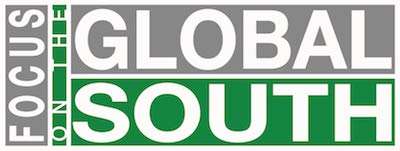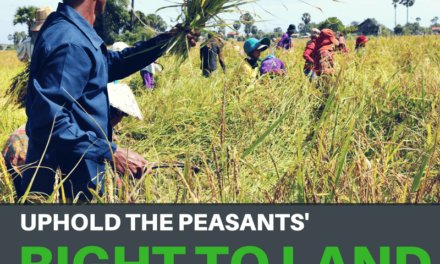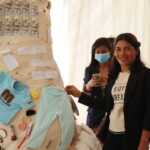Focus on the Global South, July 27, 2004
In preparation for the World Trade Organization General Council Meeting on July 27-28, the Chairman has released a draft text as a basis for negotiations. This July framework, as it is called, is projected as a penultimate effort to bring the derailed organization back on track. As a closer inspection will show, however, this framework does nothing to address the demands of developing countries.
There is only one thing that developing country governments can do with he proposed July framework: dump it. The text is so unbalanced in favor of the interests of the trade superpowers that one wonders if these governments have been listening at all to the rising crescendo of protest from developing counties that culminated in the rebellion that resulted in the collapse of the Fifth Ministerial in Cancun in September of last year.
The main reasons for rejecting this flawed text are the following:
– The Framework for Agriculture is simply an exercise to devise increasingly intricate mechanisms to accommodate the United States and European Union’s efforts to maintain the high levels of subsidization oftheir agricultural interests behind a smokescreen of vague promises to address the concerns of developing countries.
– The Framework for Market Access for Non-Agricultural Products (NAMA) simply reproduces a text rejected in Cancun by the developing countries since it amounts to nothing less than a prescription for their deindustrialization.
– The Framework on Trade Facilitation is nothing but a stubborn effort on the part of the trading powers to keep alive an issue that lacks the necessary explicit consensus of all members to be a subject of negotiation.
– Lip service is paid to the main concerns of developing countries, specifically, the cotton issue, special and differential treatment, development, and implementation, but they are actually treated as secondary issues the negotiation of which is consigned ณto future negotiations and left in the air.
AGRICULTURE
This text does not form the basis for rectifying distortions in agricultural trade. The EU and US provide between US$70-80 billion each in domestic supports. This draft is the legal framework US and EU need for legitimizing the continuation of these supports.
The key concerns of developed countries have been given the green light whilst developing countriesน concerns have not:
– An enlarged Blue Box for the US to house its 2002 Farm Bill payments;
– No limits or reductions on the Green Box which is the major culprit legitimizing dumping since for the US. Over $50 billion a year of supports (or 70% of USน domestic supports) are accounted for under this category. They are indirect export subsidies and should be treated as such. Essentially, cuts will be made to trade-distorting supports but these will be compensated through the Green and Blue boxes, i.e., this is a public relations box shuffling exercise.
– Sensitive products for the EU (or up 20% of their tariff lines) will be protected. In contrast, despite developing countries insistence over defending crops critical for food security and rural livelihoods, the text postpones dealing concretely with this issue.
– The pledge by the EU to eliminating export subsidies is also feeble since it is depends on others first fulfilling their commitments, e.g. US in export credits and food aid, and Canada as well as developing countries in “disciplining” their State Trading Enterprises (STEs). The deregulation of STEs, if applied also to developing countries STEs as the text implies, would be disastrous since STEs stabilize prices and food supply and play a critical role in ensuring food security.
COTTON
The text will not provide what the West African cotton countries have been demanding: an end to subsidies in cotton. Moreover, contrary to their demand, the text treats cotton as part of the agriculture negotiations, thus undermining its satisfactory resolution.
Promises to cap the product-specific supports US gives (to the tune of US$2.8 billion) is a futile exercise. Given the political weight of the US cotton lobby, US supports to cotton will simply re-emerge in the new Blue Box or the untouched Green Box.
MARKET ACCESS FOR NON-AGRICULTURAL PRODUCTS (NAMA)
There is hardly any difference between the reject Derbez Text and the July package in this area, which means that developing countries should again reject its reincarnation as Annex B of the text.
The language suggests that unbound tariff lines shall be subjected to non-linear approach, after they are bound at twice he applied rate. This would have very serious adverse implications for developing countries. Firstly, the applied rates have never been used as the basis for calculating tariff reductions. Secondly, the language of the text suggests that after negotiations, countries should bind all their unbound tariffs, which, again is a new addition to the modalities of negotiations.
The text directs that work continue on a non-linear formula applied on a line-by-line basis. This means that higher tariff rates would be subject to steeper tariff cuts. This kind of process of reduction of tariffs woulddrastically reduce the space for a number of developing industrializing countries to protect their small industries.
The approach suggested in the July package for tariff reduction does not allow countries to choose their own rate, scope, pace and extent of future liberalization so as not to cause further adverse effects on loca industries. Moreover it does not address problems that poor and developing countries will face from erosion of preferences. This package would never allow poor countries to build their supply capacity but would in fact lead to massive deindustrialization. All these features go against the demands being made by least developed countries on NAMA negotiating text since the Cancun Ministerial Conference of the WTO.
SINGAPORE ISSUES
In order to appease countries such as India and Malaysia, the July text says that negotiations on investment, competition and government procurement will not form part of the Work Program and goes ahead to mention that no work towards negotiations on any of these issues will take place within the WTO during the Doha Round. This is a deceptive formulation, for it does not mean that these issues are out of the WTO system, as the developing countries have demanded. They can be resurrected in some future round of negotiations.
In fact, the inclusion of trade facilitation in the July package as an item for negotiation is questionable since the Doha language clearly states that the explicit consensus of all members is necessary to begin negotiations on any of the Singapore issues. Moreover, the Doha language is also clear that if negotiations on any of the Singapore issues did not begin at the next Ministerial (i.e. at Cancun Ministerial Conference), then there would be no negotiations on any of these four issues. If this was the agreement and the July package brags about being accountable to the Doha Mandate then it has no right to include language that would suggest initiation on negotiations on trade facilitation.
IMPLEMENTATION AND SPECIAL AND DIFFERENTIAL TREATMENT
This text, like the Doha Ministerial statement, trumpets on its concern for developing countries by including S&D and some language on developmental concerns. The WTO however has to realize that people cannot be fooled by the same trick twice.
The language is non-committal and at best can be described as vague. Importantly all the vague promises in the paragraphs associated with these issues, turn out to be wasted promises if the text within NAMA and agriculture negotiations gets implemented.
Although new deadlines have been stated in the July package with respect to completion of the work of the Committee on Trade and Development, the history of negotiations at the WTO is replete with examples, which show that deadlines are not honored when it comes to implementing decisions benefiting developing countries.
SERVICES
The services paragraph in Annex C is kept the least controversial in order to show that at least negotiations in this sector are on track. The truth is far from this. Countries are not coming forward to make offers to requests made. A number of developing countries do not see any reason for offering their service sectors as they are still grappling with existing problems and ambiguities in the GATS agreement. Their need for caution has been underscored by the April 2004 WTO dispute panel ruling against Mexico in the Telemex case where clauses in the GATS and auxiliary GATS annexes, that seemingly allowed developmental aspects of domestic regulations, were disregarded. In short, the services negotiations continue to be biased against developmental concerns.
IN CONCLUSION
If there is one thing that links the July text, the Doha Ministerial Declaration, the defunct Ministerial Draft in Cancun, and the rejected Derbez text, it is this: all have been extremely unbalanced documents designed to protect and advance the interests of the trade superpowers at the expense of the developing countries.
It is extremely hypocritical for World Trade Organization Director General Supachai Panitchpakdi to claim that the July text advances the “Doha Development Agenda”, since neither the Doha Ministerial Declaration nor the July text have anything to do with advancing development.
The continuing intransigence of the trade superpowers and their determination to push their interests within the WTO framework shows how dysfunctional that framework has become as a mechanism for protecting, much less advancing, the economic interests and welfare of the developing world.
The developing countries have waited for nearly ten years for the WTO to show some responsiveness to their needs. For this patience, they have been rewarded with a succession of anti-development proposals and programs culminating in the July text. Thus, it is important that they not only reject the July text but also move actively to find or create other mechanisms or frameworks to secure their interests outside the WTO.
Development can no longer be pursued within a WTO paradigm.







